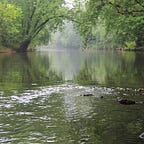Permanent conservation payments increase again
Most lands in Mower see RIM increase of over $2,000 per acre
March 21, 2024 — Payments have increased significantly for Mower County landowners willing to convert cropland into permanent native prairie and restored wetlands, especially in flood-prone areas.
Most qualifying lands in Mower County have increased by more than $2,000 per acre through the Reinvest In Minnesota (RIM) program and state-federal MN CREP program that combines RIM with USDA’s Conservation Reserve Program (CRP).
Overall, payments now are about $9,000 to $11,000 per acre for RIM and $12,000 to $14,000 per acre for MN CREP, said James Fett, a Mower Soil & Water Conservation District technician who oversees MN CREP and RIM signups in Mower County.
“Landowners with cropland that floods regularly, doesn’t produce good crop yields or has challenges with soil erosion, we likely have a program that fits your land and will pay you well,” Fett said.
Landowners accepted into MN CREP enroll in the federal CRP for 14 to 15 years. At the same time, the land is put into a permanent conservation easement through the state’s RIM. MN CREP payment rates vary based on the cropland’s location in the county, Fett said, and is determined by each township’s average assessed tillable cropland value per acre.
Under RIM, more types of cropland also now can qualify for the program due to recent changes, Fett said. There are four active RIM programs in addition to MN CREP, he said, with a fifth RIM option coming soon.
Mower SWCD encourages farmers and landowners to visit with them to learn about the potential opportunities for their land.
Cropland already enrolled in federal CRP can qualify for permanent conservation under RIM, Fett said.
For MN CREP, there is just one application period in 2024 due to the potential of a new federal Farm Bill being passed by the U.S. Congress, Fett said. Applications for MN CREP are due by April 30.
Since MN CREP was launched in 2017, Mower County has had 15 easements enrolling 748 acres. Overall, a little more than 3 percent of Mower County’s 385,000 acres of cropland are in permanent or temporary conservation easements.
Just a year ago, the MN CREP payment rates increased on average by $2,900 per acre as decided by the Minnesota Board of Water & Soil Resources (BWSR), a state agency. Average MN CREP payment rates in Mower increased at the time from about $7,600 an acre in 2018 to about $10,500. MN CREP payments in Mower County range from about $9,900 per acre to $11,100 per acre depending on the township.
By the end of 2022, higher land-sale prices had led many landowners in Minnesota to decide not to apply for MN CREP until the program’s payments increased to reflect those land-value changes, Fett said.
“If you’ve been on the fence about enrolling cropland into MN CREP, this is the best time ever to learn more about the program and the potential opportunity for you,” Fett said.
During the 2023 construction season, Mower County’s upper Cedar River corridor had 186 acres of cropland enrolled into MN CREP native prairie and/or wetland restoration. About 104 of those acres were in Udolpho Township (Mower’s northwest corner) and another 82 acres downstream in Lansing Township. Another 57 acres in Udolpho are set in 2024 for being restored to native prairie and wetlands.
In Lyle Township, another 78 acres along the Cedar River, south of Austin, have been approved for MN CREP, with the hope for restoration work to be done in 2024, Fett said. This cropland is highly prone for flooding, and its restoration will connect to a large area of woods and permanent conservation acres along the Cedar River.
These enrollments will improve water quality and wildlife habitat in local watersheds, Fett said.
Mower County landowners interested in MN CREP or RIM should contact Fett at james@mowerdistrict.org or 507–460–4592.
